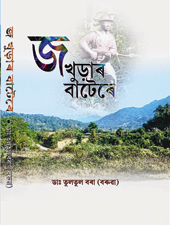 |
| The book cover |
Jorhat, Oct. 31: The Stilwell Road, which starts from Ledo railhead in Tinsukia district of Assam and runs on to Kunming in Yunnan district of China, as well as the man who was instrumental in its construction has been the subject of many books and films.
Latest in the line-up is Joe Khurar Baatere, an Assamese novel written by Tultul Bora (Barua), a doctor by profession here and the author of a few books.
Set against the backdrop of World War-II, Joe Khurar Baatere focuses on the persona of US General Joseph Warren Stilwell and draws heavily from the Stilwell Papers written by him. “I accessed a copy of the book from the Santa Fe library, Santa Clara, California, printed in 1948, and a 1943 first print copy of Retreat with Stilwell written by journalist Jack Belden, who had accompanied him in Burma. Based on these, I have attempted a historical novel,” she said.
Bora said her novel is a part reconstruction of the war in this part of Asia in which Stilwell had successfully stemmed Japanese inroads into China from the Burma side, though the Allied forces had to beat a retreat initially.
“Stilwell is a very interesting figure as revealed in his diary and by others who have written about him. Few know that he did not like to party and did not drink, as is usually assumed of an army man. He was a family man with five children. His diary entries were all addressed to his wife, Dear Winfred,” she said.
Bora said the thoughts and feelings of this great man, who played such a stellar role in defeating the Japanese army as the chief of army staff under Generalissimo Chiang Kai-shek of China, and his own interpretations of war strategies made for fascinating reading.
“I have retold in a narrative form his thoughts and feelings, as well as some interesting events and anecdotes, through one of my characters,” she said. “But I have been careful not to flout the copyright rules of the US and desisted from copying a short poem written by Stilwell on Chiang Kai-shek referring to him as Peanut,” she added.
Some of the little known facts the book gives a peek into are Stilwell referring to Chiang Kai-shek as Peanut because he could not digest him, the exciting escape from Burma by burning bridges and trucks, playing gin rummy in the face of heavy shelling by the Japanese.
It is also interesting to know that Lt Gen. William Joseph Slim, Earl Louis Mountbatten, the then chief of army staff, and Stilwell had all analysed the war strategies at the Jorhat army airport station here.
Reviewed by former Asam Sahitya Sabha president Nagen Saikia and writer Keshada Mahanta, the 312-page novel is at the printers and scheduled to be released in November. Saikia has said that the book, which has politics, history and the author’s own reflections, will find a place in Assamese literature.
Two other writings in Assamese on Stilwell Road already published are Ali Bator Riti Kotha by Purabi Bormudoi and Ledo Lam by Juri Borah Borgohain, apart from history books.










